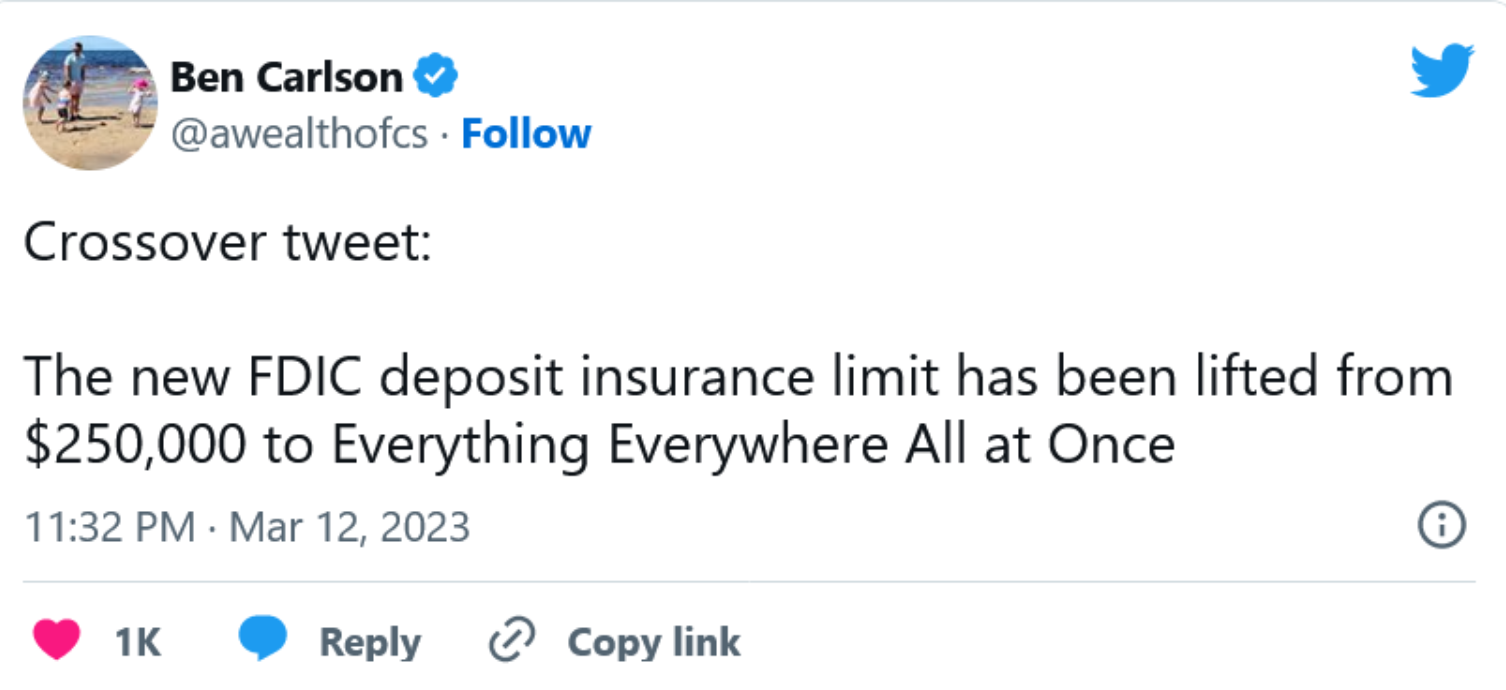The Daily Escape:

Spring wildflowers, Four Peaks Wilderness, AZ – March 2023 photo by Chris Flores
(This will be the final column for this week as Wrongo and Ms. Right are heading to CA for the Napa Valley wedding of granddaughter Nicole. Columns will resume on 3/23)
Several readers commented on how Silicon Valley Bank’s (SVB) major problem went beyond Wrongo’s discussion of asset management. They’re all former bankers and former colleagues of Wrongo, and they rightly brought up liability management as a key contributor to SVB’s problem.
For banks, the deposits that people make are the bank’s liabilities. The essence of banking is borrowing short term (deposits, overnight borrowings and medium term borrowings) in order to lend that money out for a longer term (mortgages, long term loans or, investments in bonds and long dated US treasuries). The difference between what they pay on their liabilities and what they earn on their loans and investments (the spread) is how banks make their profits.
SVB had little risk that their loans wouldn’t be eventually paid back (credit risk), but they did have substantial interest rate risk if rates went up. That included the risk that the face value of the bonds they invested in would decline in value in higher interest rate scenarios.
This is a well-known challenge for all banks. They try to maintain enough of their assets in easily sold investments so if there’s an unforeseen need to pay out cash to depositors, they can meet that need. The bigger the expected (or unexpected) cash need, the more assets the bank must hold that are easily converted to cash.
It wasn’t a surprise to the banking industry that the Federal Reserve (Fed) was raising rates; Chair Powell clearly said they were going to do that until inflation was under control. Basic liability management principles should have told SVB to move to hedge the risks in a rising rate environment by investing more in very short term (near cash) assets. But SVB didn’t. Maybe they thought they knew better.
SVB isn’t alone. The Fed raised interest rates quickly and sharply during 2022, so the face value of bonds fell. According to the FDIC, US banks were sitting on $620 billion in unrealized losses (assets that had decreased in market value but were still on their books at purchase price) at the end of 2022.
Of that amount, Bank of America alone had unrealized losses of around $114 billion, or 18% of the total.
A major risk that the banks didn’t correctly anticipate was the effect of huge cash injections into the economy during the pandemic, along with a prolonged period of historically low interest rates that predated the pandemic. That had ripple effects on all banks. According to Marc Rubinstein:
“Between the end of 2019 and the first quarter of 2022, deposits at US banks rose by $5.4 trillion. With loan demand weak, only around 15% of that volume was channeled towards loans; the rest was invested in securities portfolios or kept as cash.”
Then came the Fed’s rapid rise in interest rates. From FDIC Chairman Martin Gruenberg:
“The current interest rate environment has had dramatic effects on the profitability and risk profile of banks’ funding and investment strategies….Unrealized losses weaken a bank’s future ability to meet unexpected liquidity needs,”
Banks do not continually adjust the value of their bond portfolio to market. So their unrealized losses can be difficult for an outsider to see. It also means banks find that selling parts of the portfolio will bring in less cash than they may need, because the securities are worth less in the market than they originally paid for them. That happened to SVB.
From Michael Batnick at Irrelevant Investor:
“Without the pandemic, rates are not at zero for two years. Without the pandemic, $638 billion does not go into venture capital. Without the pandemic, rates don’t go from 0% to 4.5% in a year. And without the pandemic, we wouldn’t be talking about a run on the bank.”
So there’s plenty of blame to go around. The SVB management surely failed: More Treasury bills and fewer bonds would have helped, that’s for sure. They had to know that their customer base, which was concentrated in start-ups, were hemorrhaging cash. They knew that they had unrealized losses in their bond portfolio. Shouldn’t they have shortened their asset mix?
Should we blame the regulators or SVB’s auditors? KPMG gave them a clean bill of health just a few weeks before they went belly up. You would think KPMG should have seen what was coming. And the Fed just announced that they are leading a review of “the supervision and regulation of Silicon Valley Bank in light of its failure.”
For SVB, the government drastically changed its policy about insured deposits. Had SVB been “The Bank of Depositors With No Political Clout”, you can bet that the $250,000 insured deposit limit would have been enforced. And depositors with larger deposits would have had to wait for their money.
But, the exception was made, and now, it will certainly happen again. Ben Carlson says it best:


